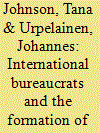| Srl | Item |
| 1 |
ID:
184651


|
|
|
|
|
| Summary/Abstract |
Contemporary peacekeeping operations carry out many disparate tasks, which has triggered a debate about “Christmas Tree mandates.” Did the UN Secretariat or the UN Security Council drive this expansion? Using original data on nineteen UN peacekeeping missions, 1998–2014, this article compares peacekeeping tasks recommended by the Secretariat to those mandated by the Council. It finds that the two bodies expressed different preferences regarding the nature, number, and novelty of peacekeeping tasks. First, the Council dropped Secretariat-recommended tasks as often as it added new ones on its own initiative. Second, the two bodies disagreed more over peacebuilding and peacemaking tasks than over peacekeeping tasks. Third, the Council preferred to be the one to introduce novel tasks that had not appeared in previous mandates. Finally, among the countries that “held the pen” on peacekeeping resolutions, the United States was the most prone to dropping Secretariat-proposed tasks and the least willing to add tasks itself.
|
|
|
|
|
|
|
|
|
|
|
|
|
|
|
|
| 2 |
ID:
131489


|
|
|
|
|
| Publication |
2014.
|
| Summary/Abstract |
Bureaucrats working in international intergovernmental organizations (IGOs) regularly help states design new IGOs. Sometimes international bureaucrats possess limited discretion in institutional design; sometimes, they enjoy broad discretion. In fact, they gain discretion even when they openly oppose state preferences. This contravenes conventional thinking about delegation: discretion should decrease as preference divergence between states and international bureaucrats increases. We develop a principal-agent theory of how much discretion states grant to international bureaucrats in the design of new IGOs. This is novel: while principal-agent theories of international delegation are common, scholars have not analyzed principal-agent relationships in the creation of new IGOs. We argue that even an international bureaucracy that disagrees with states' design preferences may enjoy substantial design leeway, because of states' need for bureaucratic expertise. In developing this argument, we employ a formal principal-agent model, case studies, and an original data set.
|
|
|
|
|
|
|
|
|
|
|
|
|
|
|
|